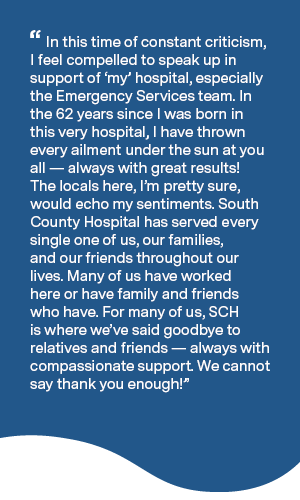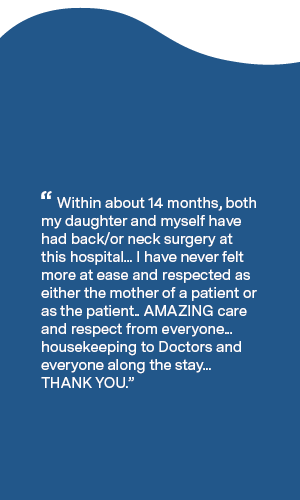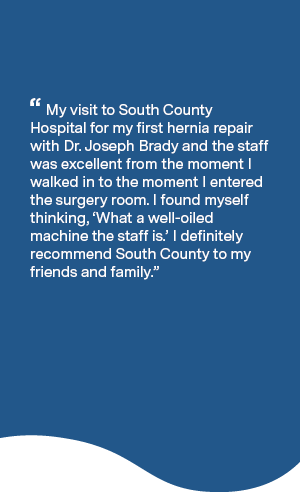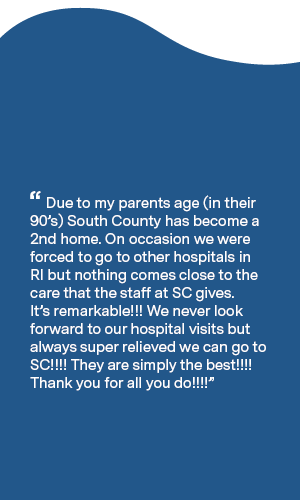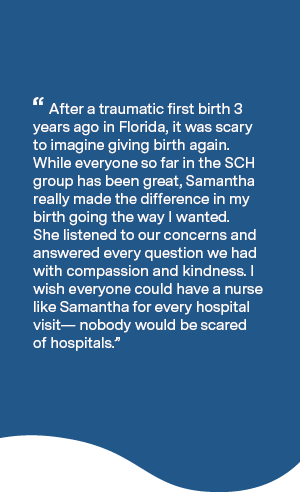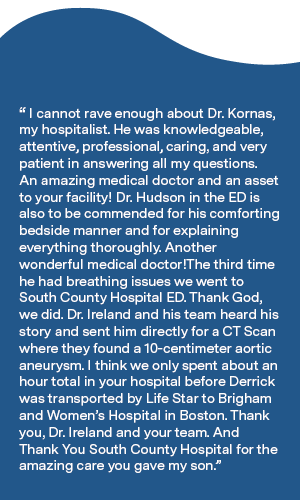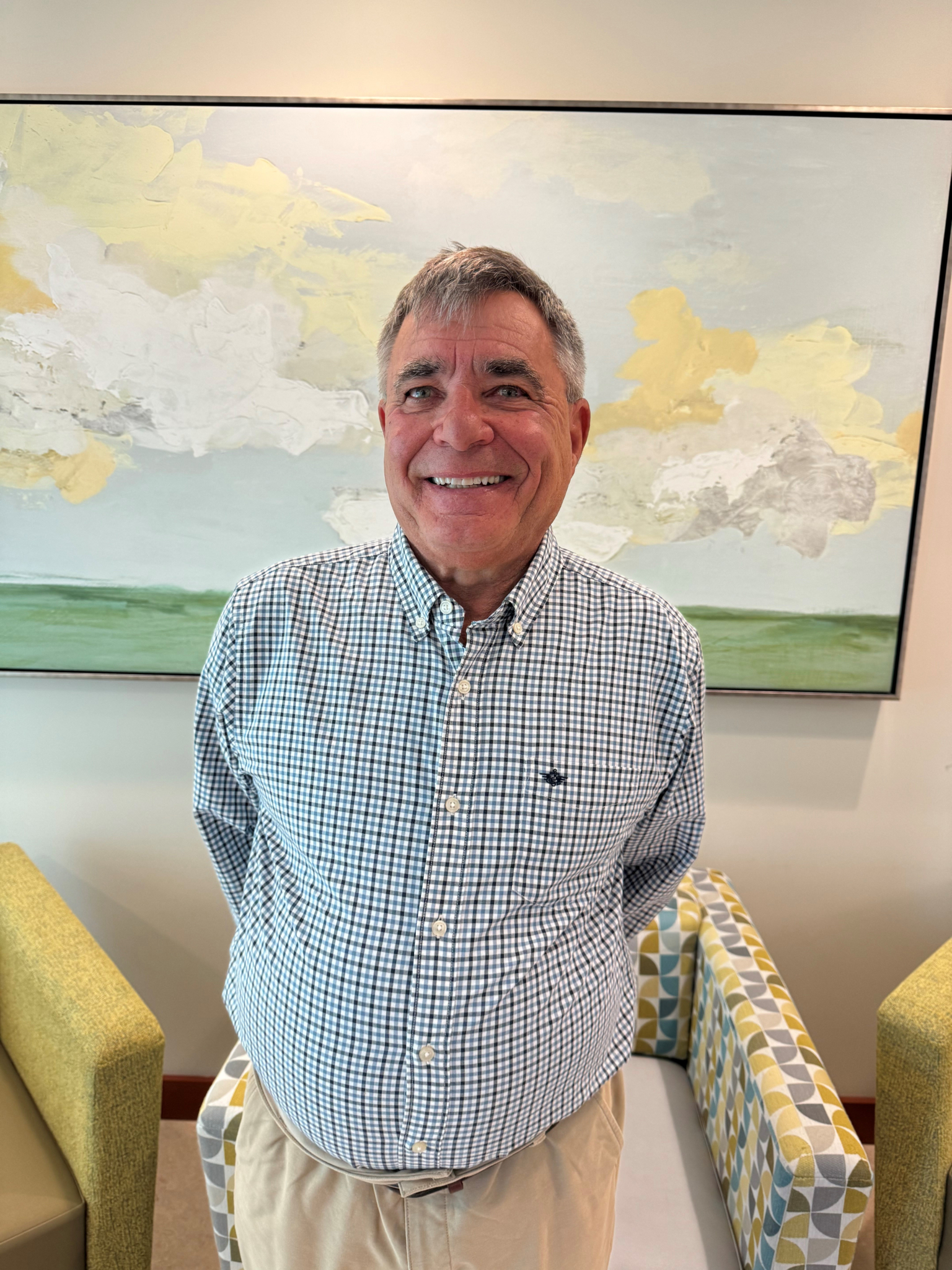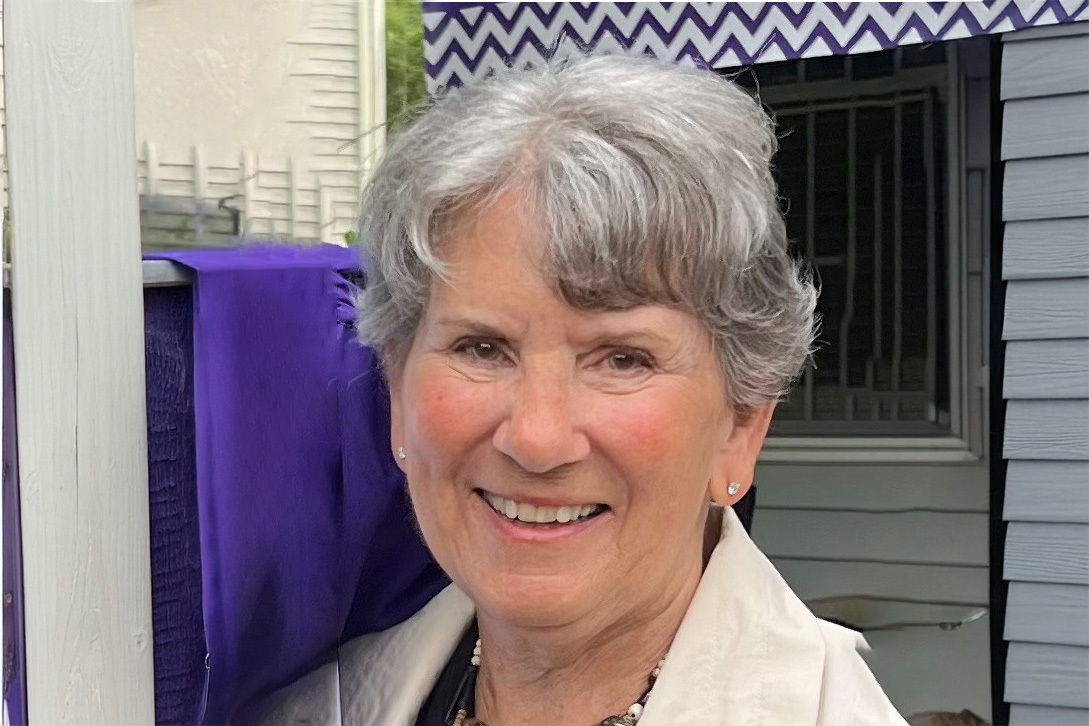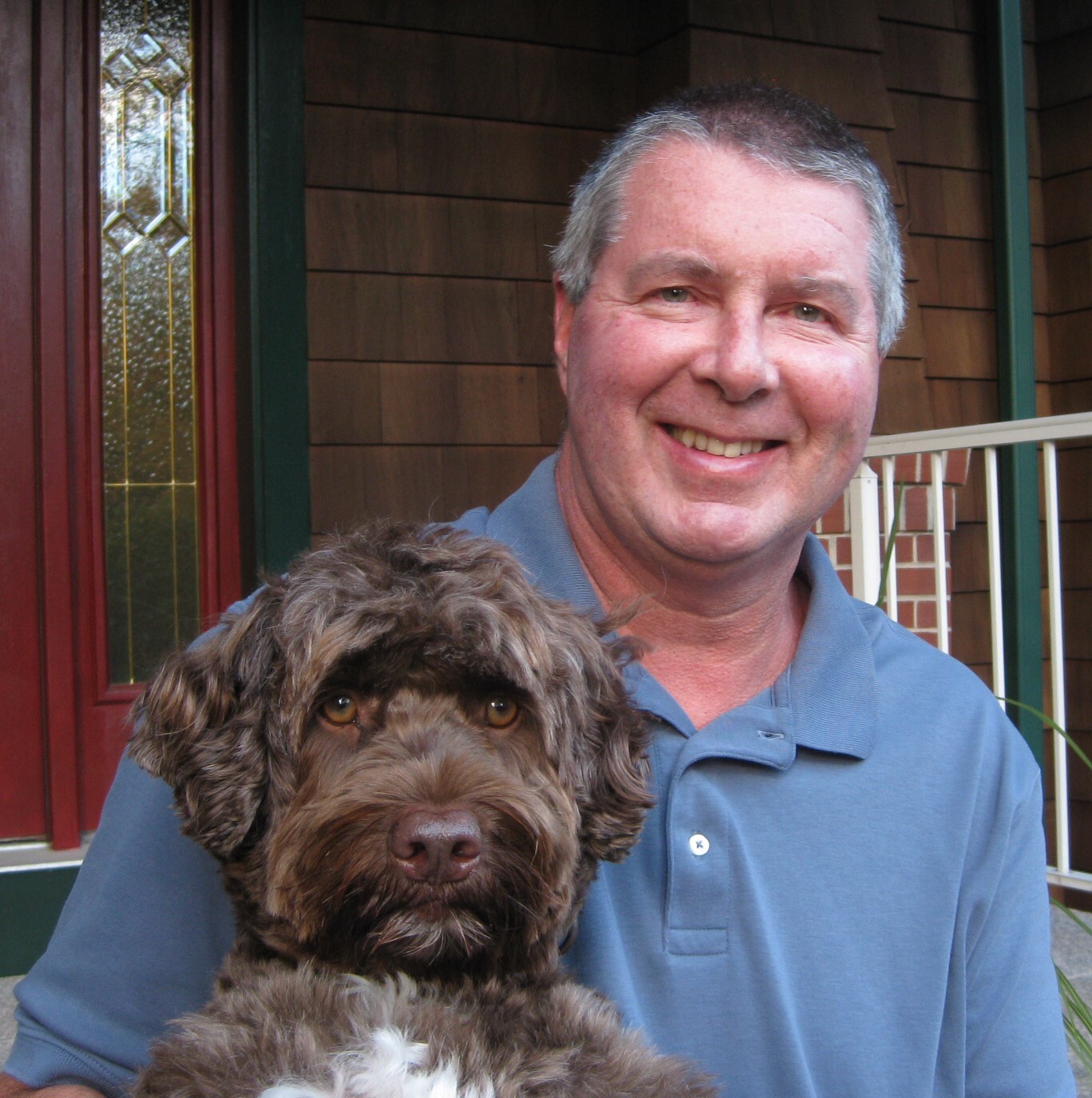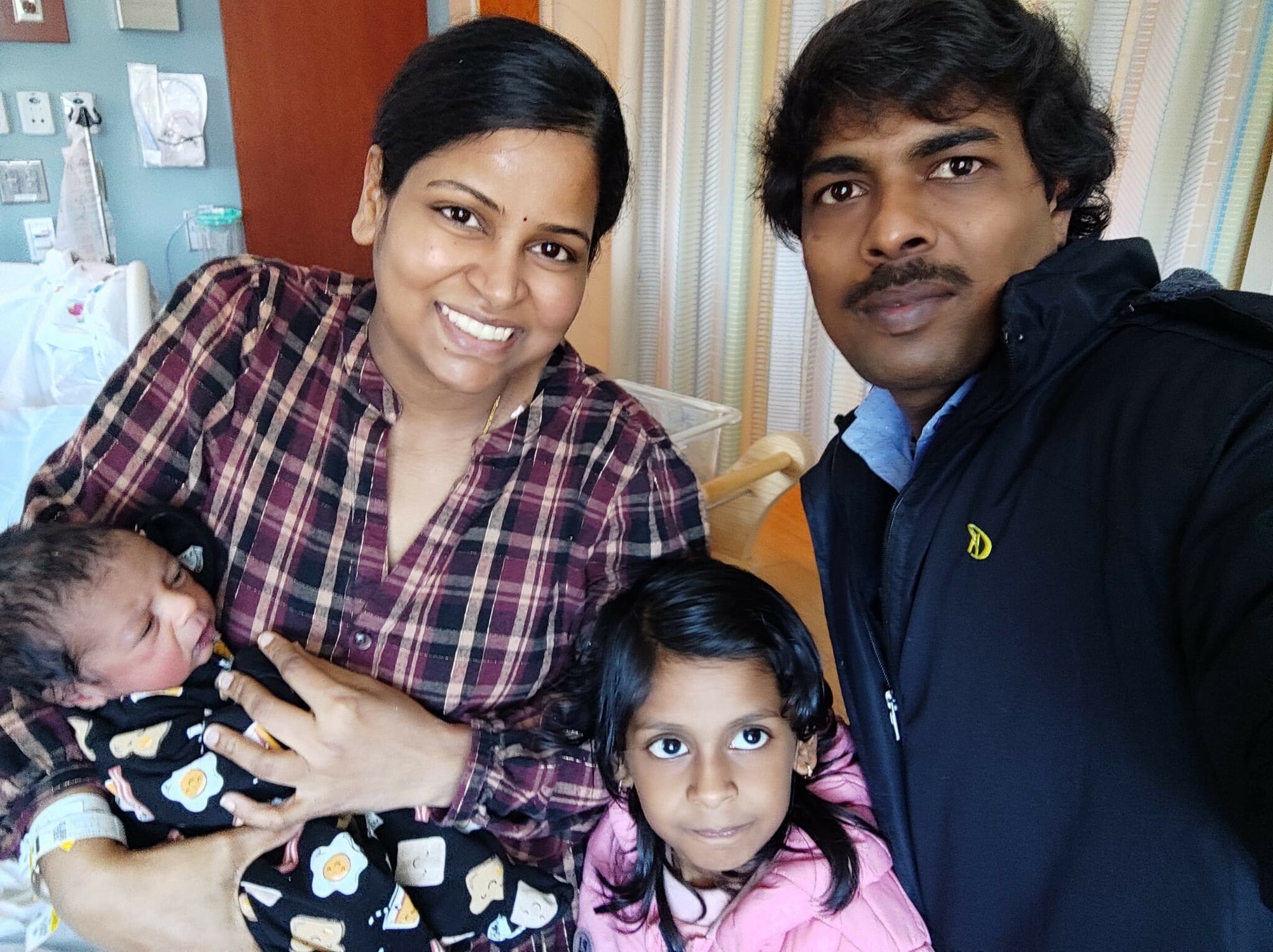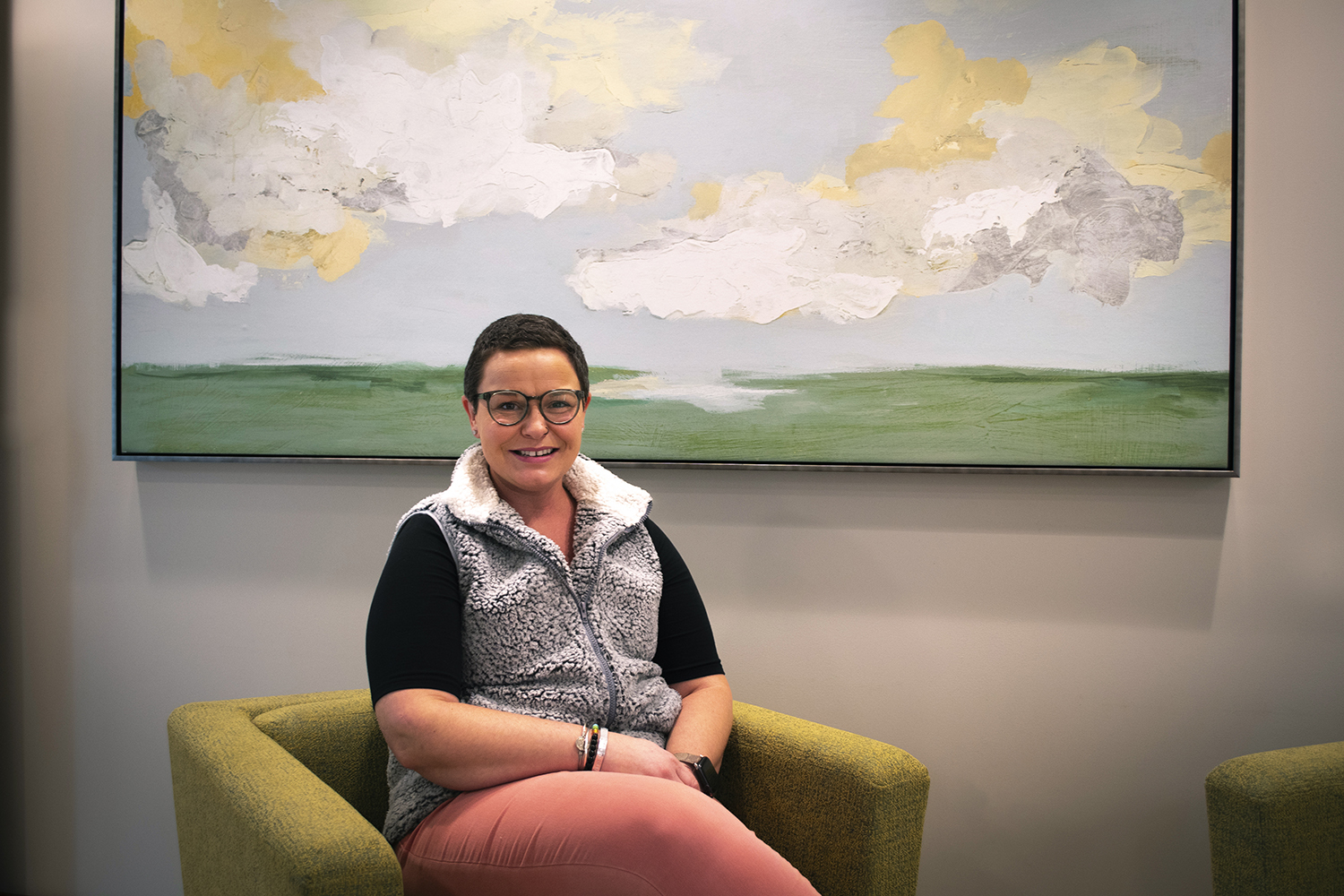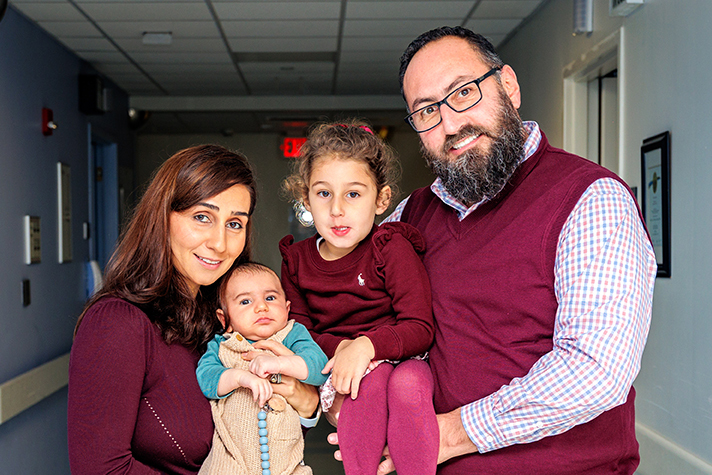Serving our South County Community
Home Health
South County Home Health is a leader in the delivery of skilled visiting nurse care, rehabilitation, wound care, and other medical and non-medical services for patients who are recovering at home. As the community grows in demographics and geography, South County Home Health responds to current needs and positions itself to pivot and meet changing needs supporting our community by providing the option of quality care at home.
We are proud to offer specialty services such as Big and Loud, Certified Diabetic Educator, Certified Wound Nurse, as well as staff certified in Lymphedema therapy and Vestibular therapy.
At South County Health, we are stewards of your health. We want you to maintain or achieve optimal health so together, we can create a healthier, more vibrant community. Our community benefit initiatives and collective health improvement efforts with diverse partner organizations, are one way that we demonstrate our commitment to the health of the South County community.
South County Health ventures toward the next three-year cycle of the Community Health Needs Assessment 2025 actively collecting qualitative and quantitative data to review to update priority areas and embark on reflect of work completed and development of new or continued improvement interventions.
2022 Community Health Improvement Plan (CHIP) guided community benefit and population health improvement activities across South County. The CHIP built upon previous health improvement activities, while recognizing focus areas of Behavioral Health and Chronic Disease Management
Goals, objectives, and strategies from the 2022 three-year CHIP are outlined below.
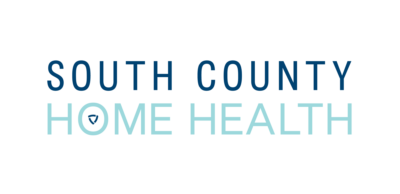
Behavioral Health
GOAL: Strengthen and support community initiatives that increase awareness of behavioral health, improve access to treatment, and promote wellness, recovery, and resilience.
- Reduce behavioral health stigma and fear of seeking treatment.
Improve access to high quality behavioral health services and supports along a full continuum of care. - Reinforce behavioral health as a chronic condition.
Chronic Disease
GOAL: Achieve equitable life expectancy and quality of life for all people by ensuring all residents have the resources they need to maintain their health.
- Promote healthy living for residents through all stages of life, with a focus on addressing social determinants of health barriers.
Patient Experience
In FY2024, South County Home Health achieved its goal of 5 Stars for Patient Experience as measured by Home Health Compare (Medicare.gov). Home Health Value Based Purchasing (HHVBP) demonstrated an exceptional result for Home Health in Patient Experience scoring.
By continuing to improve upon best practices, our goal is to achieve a 5-Star rating in Patient Quality metrics.
Focused efforts will:
• Optimize best practices with scheduling around patient preferences.
• Support newly admitted patients with in-home leadership rounding and follow-up on discharge calls to ensure smooth transition back to community support.
Alzheimer’s and Dementia Plan
South County Health primarily serves the residents of Washington County. According to the United States Census Bureau, Washington County has the second-highest percentage of residents aged 65 and older in Rhode Island, with 24.3 which is 5% higher than the state average.
Alzheimer's disease represents a growing public health challenge in Rhode Island, particularly among adults over 65. In 2020, approximately 24,000 Rhode Islanders in this age group were living with Alzheimer’s, making Rhode Island the state with the third-highest prevalence of the disease in New England.
Recognizing the unique needs of this vulnerable population, South County Health implemented the care model known as Hospital Elder Life Program (HELP) at South County Hospital to provide supportive care for patients with dementia and Alzheimer’s during their hospital stay. This program aims to enhance the well-being and outcomes of these patients.
HELP is a comprehensive, multi-component program designed to support hospitalized seniors in maintaining their physical and cognitive functioning. Through cognitive exercises, companionship, and engaging activities, each patient receives a personalized plan that encourages both mental and physical activity.
By combining the efforts of hospital staff and volunteers, HELP offers regular assessments, supportive visits, recreation, and exercise opportunities. These interventions help seniors at risk of cognitive decline stay mentally and physically active during their hospital stay, ensuring a smoother transition to home and reduce the risk of long-term institutionalization. The program’s impact is significant: studies have shown that HELP reduces delirium rates by 40% and functional decline rates by 67%, while also shortening hospital stays.
Community Healthcare
The Community Health Division provides stewardship for the community through strategic, collaborative partnerships with other organizations whose mission and vision support the health and well-being of residents within the communities we serve.
Healthy Bodies Healthy Minds
Healthy Bodies Healthy Minds (HBHM) provides programs that focus on system-level changes through a convener of community partners with individual community-based support offered through the Community Health Team and other specialized programs.
To ensure inclusivity of all communities within Washington County, South County Health provided administration and staffing for the HBHM program for its role as one of 15 Health Equity Zones (HEZ) in the state. HBHM is funded by the Rhode Island Department of Health, Substance Abuse & Mental Health Services Administration, The Rhode Island Foundation, and Blue Cross Blue Shield of RI.
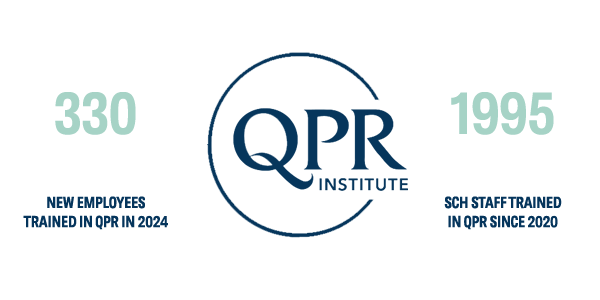
Washington County Zero Suicide Program (WCZSP)
WCZSP takes a population health approach to suicide prevention by implementing Zero Suicide within the region’s eight major healthcare organizations, including South County Health. An important part of this effort is having an adequately trained workforce and universally screening patients for depression and suicidality.
Programmatic sustainability at South County Health includes Question Persuade Refer training to all new employees at orientation, standardized screening for all patients on suicide risk and behavioral health needs with defined care plans. Screening in emergency room triage for imminent suicidal risk.
Behavioral Health in RI
Washington County is a designated mental health shortage area due to an inadequate number of providers and inpatient beds. The Mental Health Association of Rhode Island recognizes multiple reasons for the current state of the mental health care landscape in Rhode Island. Lack of resources, however, is cited by 67% of providers as a reason for not being able to accommodate new patients into their already full caseloads.
Behavioral health continues to be a high area of focus with 1 in 4 Washington County adults report excessive use of alcohol higher than state and national overall. The proportion of adults experiencing mental distress/depression has increased in Washington County, statewide and national. Short staffing and lack of available beds has led to long wait times and delayed services. 1 in 3 Rhode Island high school age youth report experiencing mental distress disproportionately higher in females and Black, Indigenous, and People of Color (BIPOC).

Community Approach to Behavioral Health
South County Health has been actively working within Washington County on improved care for behavioral health patients for many years, collaborating with local partners, people with lived experiences of behavioral health issues, and state and local officials. While there is a crisis at hand, we are working toward sustainable improvements including investments in:
- Behavioral Holding Unit (ED-B)
- Psychiatry services
- De Escalation Training
- Suicide Prevention Training
- Behavioral Health Trained Nurses and Ancillary support
- Care Plans and Clinical Pathways
- Utilization of Newest Medication Regimes
- Community Health Workers
- Peer Support Workers
- Leveraging Patients with Lived Experiences
- Growth in Social Work Services
- Paramedicine
Collaboration with Local and State Partners
Testimonials & Patient Stories
Every year, thousands of patients pass through our doors with stories of struggle, strength, hope, and perseverance. Many will form special and lasting bonds with their doctors, nurses, social workers, and other staff.
The following selection of patient stories and testimonials from this past year speak to the essential role South County Health plays in our community.
